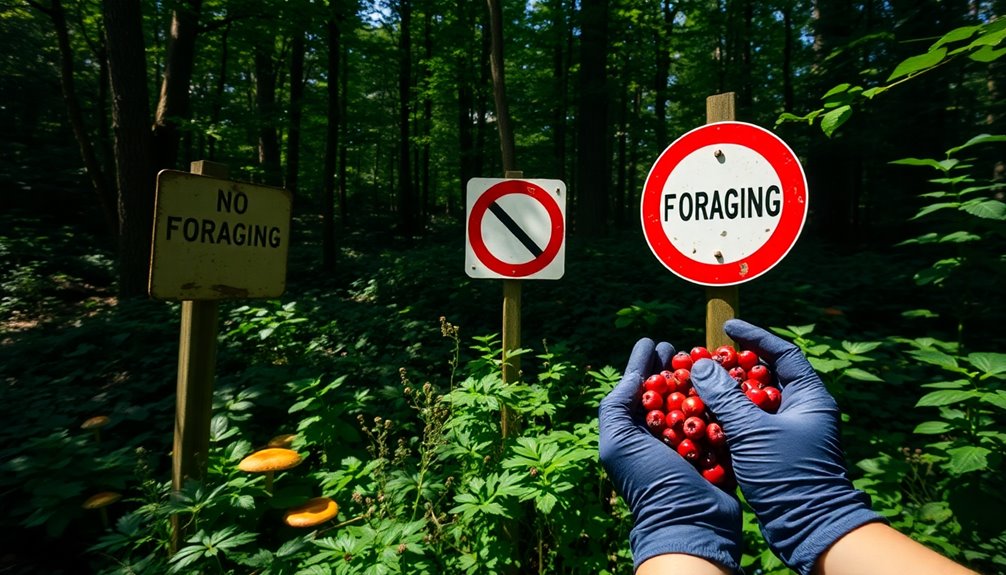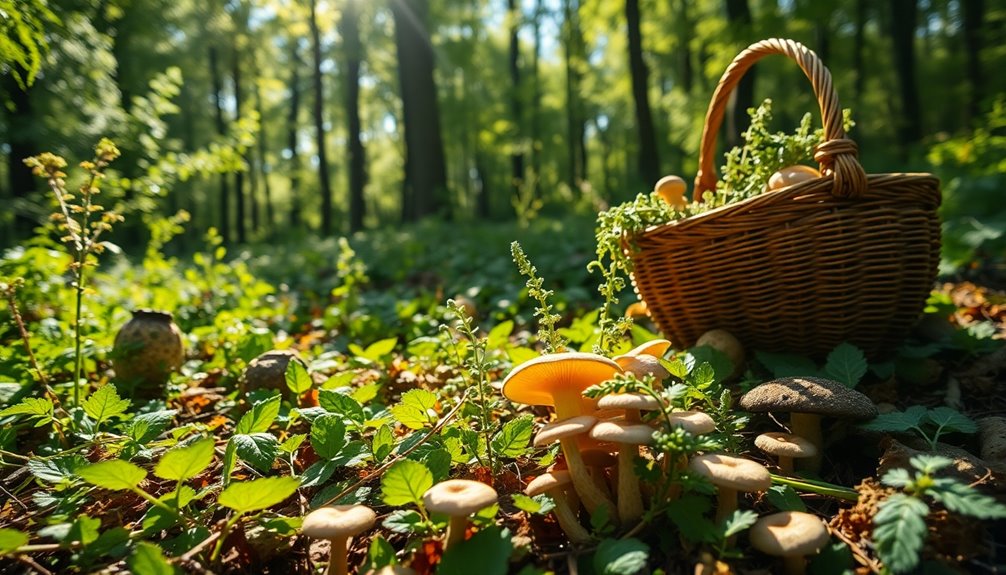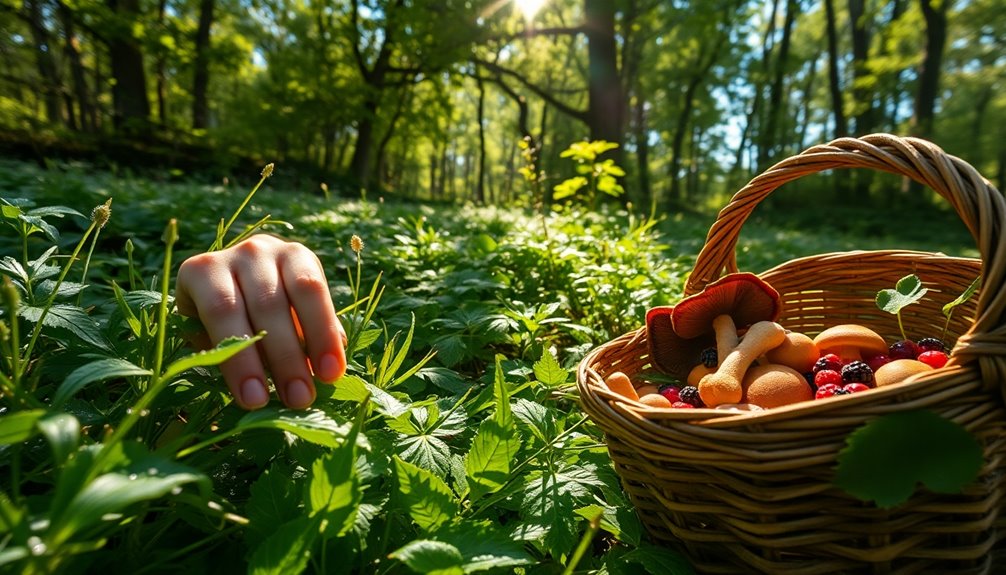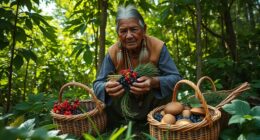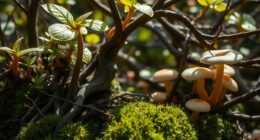Foraging's become illegal in many places due to a mix of regulations, environmental concerns, and historical factors. While it promotes sustainability and community, unchecked foraging can harm local ecosystems, causing biodiversity loss and disrupting habitats. In addition, laws vary widely, leaving many confused and inadvertently breaking rules. These restrictions often stem from a history of racial inequality, affecting marginalized communities who rely on foraging for cultural identity. The current legal landscape might seem harsh, but understanding these complexities reveals the deeper issues at play. You might find surprising insights about foraging's rich history and its impact on society.
Key Takeaways
- Foraging is illegal in many areas due to regulations aimed at protecting public and private property rights.
- National parks impose strict bans on foraging to conserve ecosystems and prevent biodiversity loss.
- Legal restrictions often stem from historical contexts, disproportionately affecting marginalized communities' access to wild resources.
- Confusion over foraging laws leads to unintentional violations, making foragers wary of potential fines.
- Overharvesting from irresponsible foraging practices can cause significant environmental damage, prompting regulations to safeguard natural habitats.
The Rise of Foraging Culture
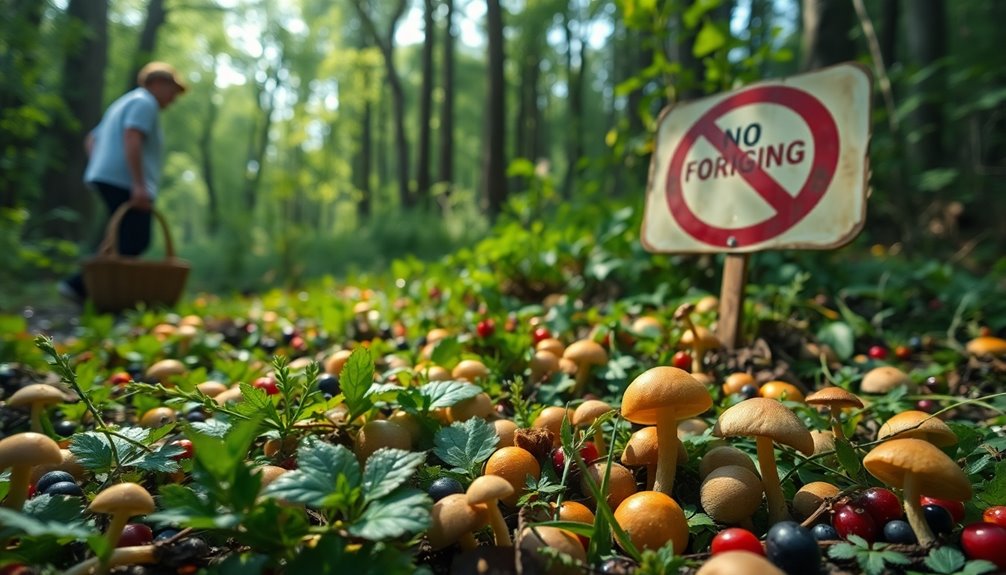
In recent years, foraging has surged in popularity, especially in urban centers like Vancouver and New York City. You might've noticed the growing interest in wild foods, as more people seek sustainable and local dining options. Restaurants like Forage and Cantinetta are tapping into this trend, showcasing foraged ingredients that elevate their menus and connect diners to nature.
Community initiatives, such as Beacon Food Forest, are creating spaces where you can engage with and learn about local edible plants. These projects are essential in fostering a sense of community and encouraging individuals to explore the bounty of nature around them. Additionally, such initiatives often provide education on safeguarding personal information while foraging, ensuring that participants are aware of how to protect their privacy in public spaces.
Plus, with the rise of foraging apps like VILD MAD, identifying and learning about local wild foods has never been easier. The master mushroom foraging secrets can greatly enhance your foraging skills and ensure you gather safe, edible varieties.
Educational resources and workshops offered by groups like REI are also helping you deepen your connection to nature through hands-on foraging activities. Whether you're hunting for wild mushrooms or gathering herbs, foraging isn't just about food; it's about reconnecting with the environment and embracing a more sustainable lifestyle.
This cultural shift toward foraging reflects a profound appreciation for what nature has to offer.
Legal Framework and Restrictions
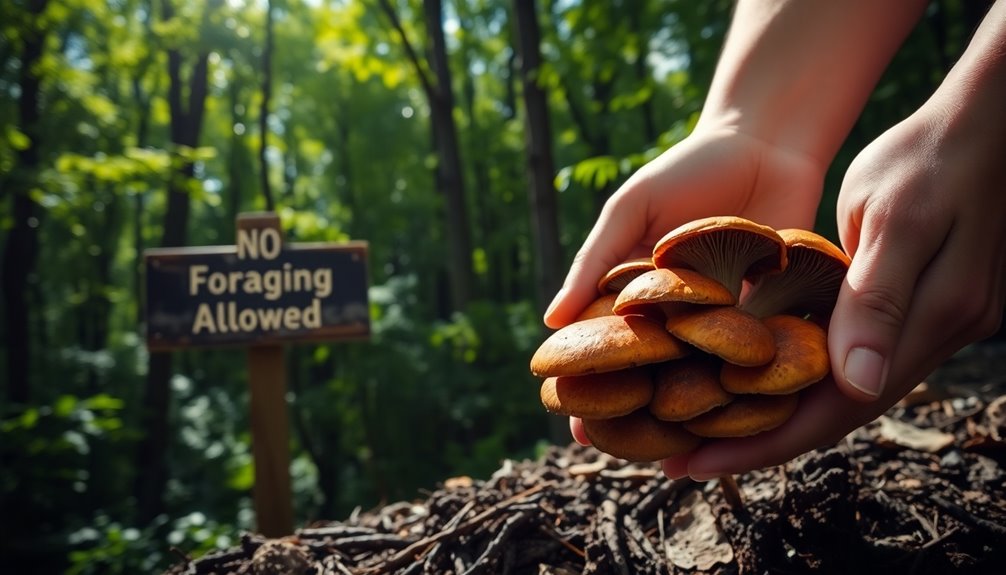
Maneuvering the legal landscape of foraging can be tricky, as regulations differ considerably from one location to another. In states like Arkansas and California, foraging in state-owned lands is strictly banned, while Alaska and Hawaii generally permit it.
If you're in New York City, be cautious—there's a complete ban on foraging in city parks, and violations can lead to fines up to $250.
The National Park Service (NPS) also restricts foraging, prohibiting the removal or disturbance of plants in national parks under 36 C.F.R. § 2.1. However, park superintendents can allow limited foraging under specific conditions.
This patchwork of regulations can create confusion, causing visitors to avoid parks altogether. Many only learn about these laws after accidentally breaking them.
It's important to note that historical anti-foraging laws have roots in systemic racism, reflecting broader societal issues of inequality. These ongoing challenges particularly affect marginalized communities seeking access to foraging rights.
Steering through Urban Law surrounding foraging requires vigilance and awareness, as the rules can shift dramatically based on where you are. Stay informed to confirm you're foraging within the legal framework.
Confusion Around Foraging Laws
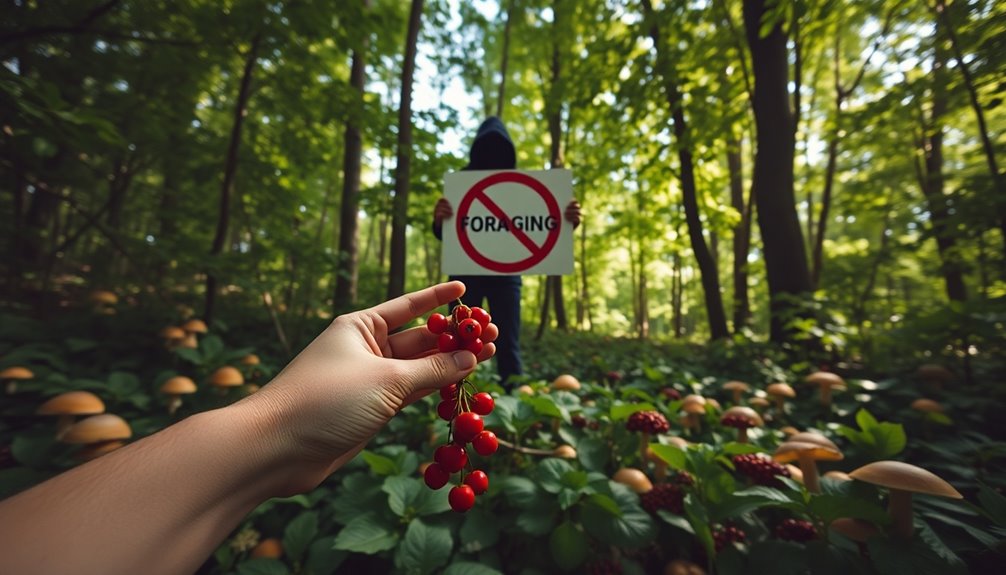
Maneuvering foraging laws can leave anyone feeling bewildered. The regulations surrounding foraging, especially for popular finds like Morel mushrooms, vary greatly across states and local jurisdictions. This patchwork of laws can lead to unintentional violations, frustrating foragers who just want to enjoy nature.
| Jurisdiction | Foraging Allowed | Restrictions |
|---|---|---|
| National Parks | No | 36 C.F.R. § 2.1 prohibits removal or disturbance of plants |
| State Parks | Yes/No | Varies; check local rules |
| Private Land | Depends | Owner's permission required |
Many visitors only discover these restrictions after they've already broken them, contributing to a sense of resentment towards parks. A 2009 NPS report showed that unclear foraging rules lead to visitor avoidance of parks, showing how confusion can ruin public enjoyment. Foragers often feel targeted by enforcement, which only adds to the frustration. If you're considering foraging, it's essential to research local laws thoroughly to avoid pitfalls and enjoy your foraging experience to the fullest.
Environmental Impacts of Foraging
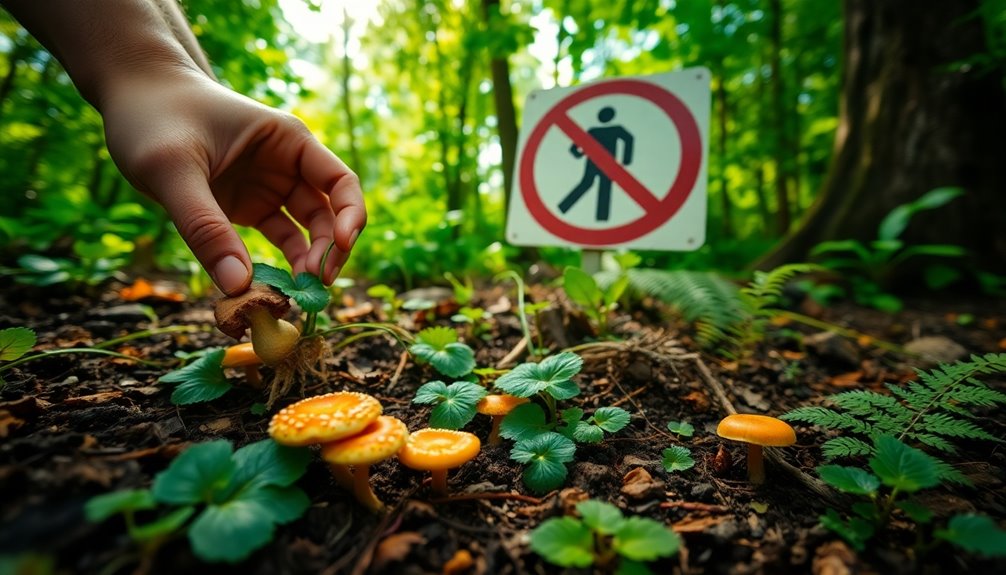
Foraging can have significant environmental impacts, especially when done irresponsibly. Overharvesting wild plant species, including mushrooms, can lead to declines in biodiversity and disrupt local ecosystems, particularly in sensitive habitats.
If you're foraging without understanding the rules around foraging, you might unintentionally contribute to ecological harm. Removing too many plants can impact soil health and animal habitats, putting the entire ecosystem at risk.
Research shows that some foraged species face population pressures that threaten their sustainability. This is particularly concerning in areas with limited resources or where rare species exist.
Without proper management, foraging can lead to local extinctions, further stressing the environment.
It's essential to balance your enjoyment of foraging with responsible practices. By following established rules and guidelines, you can help prevent habitat degradation and guarantee that plant populations remain resilient.
Engaging in responsible foraging not only protects local ecosystems but also enhances your experience, allowing you to appreciate the natural world while preserving it for future generations.
Historical Context and Racism
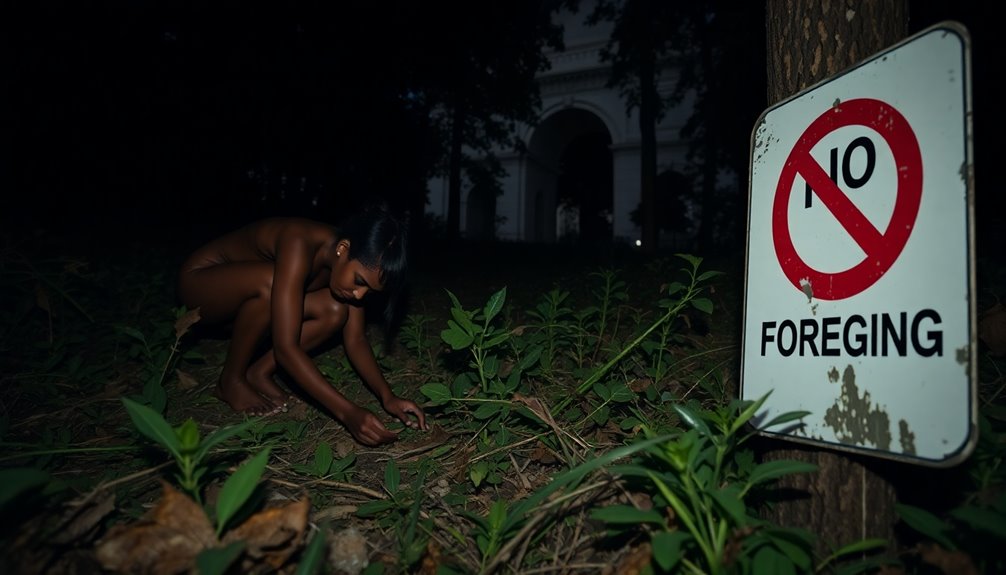
The history of foraging in the United States reveals a complex interplay of culture, survival, and systemic racism. For many Black communities, foraged foods were essential during slavery, helping to supplement meager rations and later serving as a source of income for freed families.
However, historical anti-foraging laws emerged to restrict their independence, forcing reliance on former enslavers for sustenance. Understanding this context is important in recognizing how current regulations continue to reflect the legacy of racial oppression.
These laws disproportionately impact Black and Indigenous communities, limiting access to traditional practices tied to local flora and fauna.
Consider these key points:
- Foraging was once a survival strategy for marginalized groups.
- Anti-foraging laws often stemmed from colonialism and classism.
- Many regulations today still echo historical injustices.
- Foraged foods represent a connection to ancestral knowledge.
- The privilege surrounding access to wild food resources is unequally distributed.
Supporting Marginalized Foragers
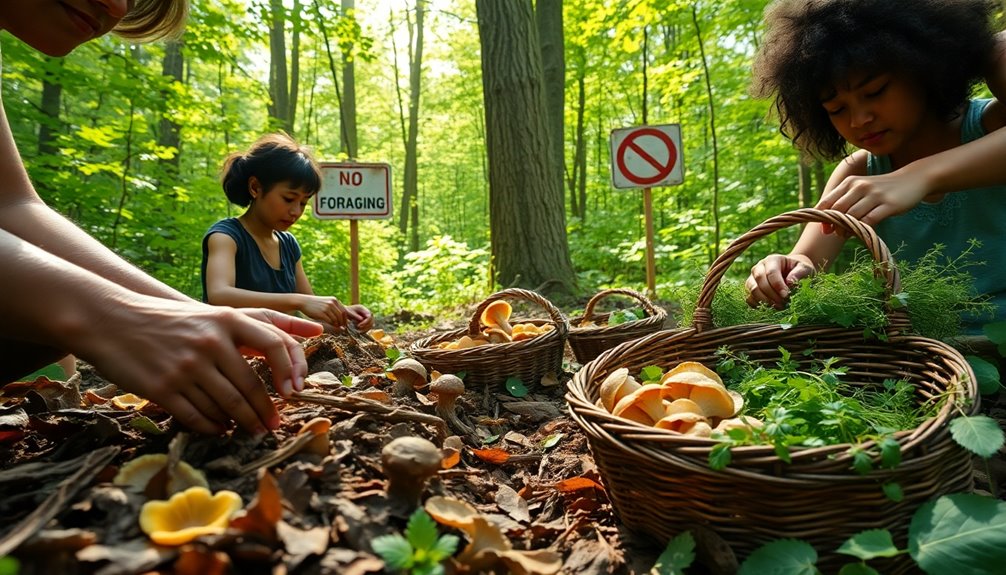
Although many people appreciate the benefits of foraging, marginalized foragers, especially from Black and Indigenous communities, often face significant barriers that hinder their ability to access traditional practices. Supporting marginalized foragers is essential for preserving their cultural identity and ecological knowledge.
One way you can help is by amplifying their voices through social media, recognizing their expertise in sustainable foraging, and advocating for fair legislation that protects their rights. Financial support can also be impactful—consider purchasing their foraged goods or donating to initiatives that empower these communities.
Here's a table showing key actions you can take:
| Action | Description | Impact |
|---|---|---|
| Amplify Voices | Share their stories and experiences | Increases visibility |
| Support Legislation | Advocate for laws protecting foraging rights | Restores ancestral practices |
| Purchase Goods | Buy from marginalized foragers | Provides financial support |
| Educate Yourself | Learn about traditional ecological knowledge | Fosters understanding |
Frequently Asked Questions
Is Foraging Illegal in the US?
Foraging isn't universally illegal in the U.S., but regulations vary by state and local area.
In some states, like Arkansas and California, strict bans exist on foraging in state-owned lands.
Meanwhile, places like Alaska and Hawaii generally allow it.
Cities, such as New York, completely prohibit foraging in parks, with fines for violations.
It's essential to check local laws before foraging to avoid unintentional legal issues.
What Is Bad About Foraging?
Foraging's got its downsides. When you pick plants and fungi, you risk overharvesting, which can harm local ecosystems and biodiversity.
You might unintentionally disrupt food webs by removing specific species, affecting wildlife. Plus, if you misidentify plants, you could end up consuming something toxic.
There's also the potential for habitat destruction, especially in protected areas, and increased competition among foragers can lead to conflicts and further environmental degradation.
What Are Three Cautions Regarding Foraging?
Did you know that over 15% of foragers accidentally harvest toxic plants? When you're foraging, you need to be cautious about three key things.
First, make certain you can accurately identify plants to avoid harmful results.
Second, be aware of local regulations; some areas require permits.
Finally, practice sustainable foraging to protect ecosystems from overharvesting.
Is It Illegal to Forage in National Parks?
Yes, it's generally illegal to forage in national parks.
Regulations prohibit removing or disturbing plants and wildlife, which helps protect the natural ecosystem. While park superintendents might allow limited foraging under specific conditions, this isn't common.
You'll often find strict enforcement of these rules. If you're considering foraging, check local regulations first to avoid penalties and guarantee you're respecting the park's natural resources.
Always prioritize conservation when exploring these beautiful areas.
Conclusion
You might think foraging should be a free-for-all, but the laws are in place for good reason. While wild edibles can be tempting, they often exist in fragile ecosystems that need protection. By understanding the legal framework and supporting marginalized foragers, you can help advocate for sustainable practices that honor both nature and culture. So, let's work together to balance our love for foraging with the responsibility to preserve the environment for future generations.

